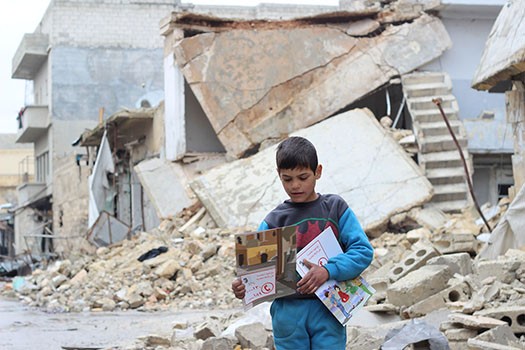After seven horrific years of conflict, the slaughter of innocent civilians, including many children, continues unabated in Syria. Attacks against residential neighborhoods and civilian targets are unrelenting, with many occurring in besieged areas where hundreds of thousands of civilians remain trapped, despite a UN resolution in February calling for another ceasefire. In just one air strike in March, 15 children were reported killed in Arbin, a city in Eastern Ghouta, when missiles hit a school where they were sheltered. With 30,000 children already dead, the humanitarian crisis continues.
Soon, the Save Syrian Schools campaign will be releasing its report on the attacks and destruction on schools and their impact on children, communities, and families. We sat down with Syria Expert Nousha Kabawat to pause and reflect on the progress made so far in building capacity, raising awareness, and initiating high-level dialogue to address what remains a perilous situation.
Why did ten Syrian organizations with diverse mandates decide to come together in the last year to create the Save Syrian Schools project?
Nousha Kabawat: There was a need to show the world—especially those with the power to act, such as the UN and those governments involved in peace negotiations—the tragic impact and deep consequences of one of the conflict’s many intolerable affronts against humanity—attacks on schools. While many in the world still avert their eyes, Syrian activists persist in doing the impossible, documenting as best they can the death and destruction on the ground and the suffering of civilians, despite the enormous risks to their own safety. The immense archive of information they’ve collected bears witness to the egregious war crimes committed in Syria—crimes that have tragic and long-lasting consequences for Syria’s population and especially its children.
What are the elements of this unprecedented collaboration?
Nousha Kabawat: In March, the Save Syrian Schools project convened a public hearing-style event in Geneva examining the impact of the destruction of schools in the context of the Syrian conflict. At the event, victims of school attacks in Syria spoke of the horrors they experienced in testimonies before a “Panel of Conscience” composed of three prominent advocates for justice: Pablo De Greiff, former UN Special Rapporteur on the promotion of truth, justice, reparation and guarantees of non-recurrence; Navanethem Pillay, former UN High Commissioner for Human Rights; and David Tolbert, former President of ICTJ. That testimony and other information about that event and the project can be viewed at SaveSyrianSchools.Org. The campaign will release its full report later this summer and are anticipating that this will be widely disseminated.
How will the testimonies of participants in the Save Syrian Schools campaign help to keep a spotlight on advocacy efforts that might otherwise go unnoticed?
Nousha Kabawat: I think the topic of the destruction of schools has gone surprisingly unnoticed over the years. Sometimes I feel we’ve ignored the topic so much mainly because it is so difficult to grasp that this could actually be happening—that schools and children could actually be targets. We sometimes want to believe that no matter how violent and ugly a war gets that redlines still do exist. And I think as human rights defenders and activists it can be hard to come to terms with the fact that, yes, this is happening, and on our watch. We need to be honest about our responsibility in creating a shared vision of Syria’s future.
What has the process looked like? How will the project assist the partners in building capacity for documentation?
Nousha Kabawat: It was an intense process, as the partners met in Istanbul for months to pull together a campaign and execute it. I believe that the main thing that the partners learned about themselves is that they are capable of working together, as a team. There has always been this idea that it would be impossible for Syrian civil society to come together and work on a project like this one because of the many differences each organization has. But during this project, they were able to align their goals, trust each other, and see their differences as strengths rather than weaknesses, complimentary rather than clashing—and that is the real reason behind the success of the project.
How did you feel when Britain signed the Safe Schools Declaration?
Nousha Kabawat: I felt very proud when Britain signed the Safe Schools Declaration. We’ve worked very closely with the UK throughout this project and their support and guidance has been exceptional. Knowing that a month after our events in Geneva they signed the Declaration makes me really believe in the power of our work in transitional justice.
What can people do to demand action?
Nousha Kabawat: We are encouraging everyone to please pledge your support to the Save Syrian Schools project by adding your signature to the petition demanding action now on the Save Syrian Schools website.
Please sign the Save Our Schools Petition here.
PHOTO: A boy carries manuals distributed by UNICEF in the Al- Sakhoor neighbourhood of East Aleppo after an informative session in January 2017 on identifying and reporting unexploded objects. (UNICEF)

